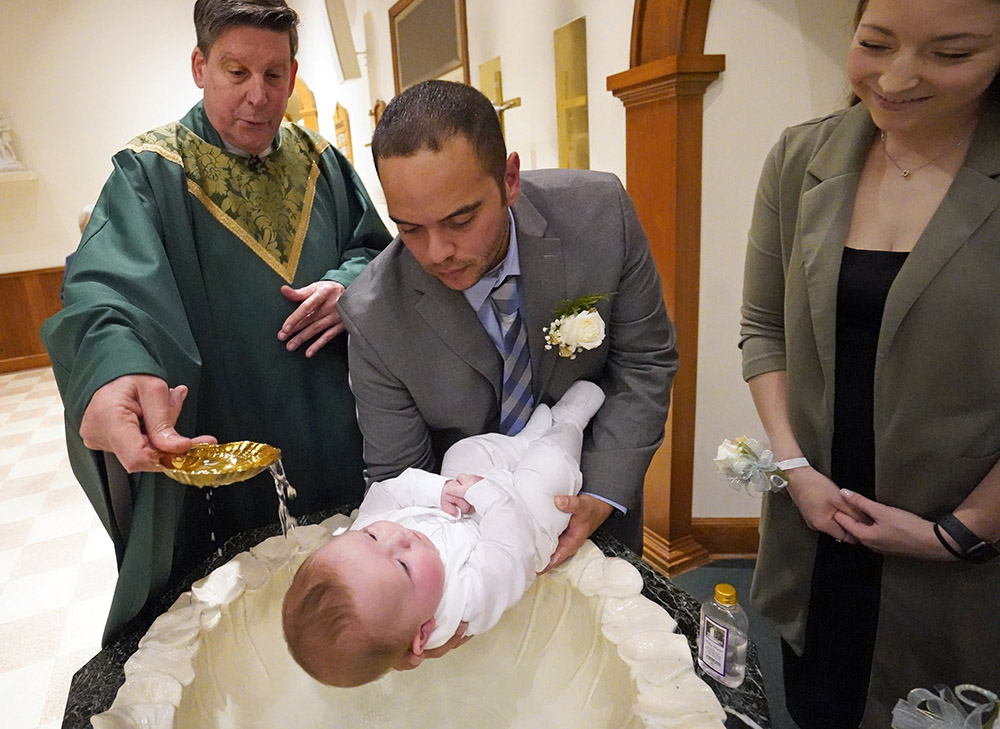
Julio Prendergast holds his 5-month-old son, Gabriel James, as he is baptized by Msgr. Frank Schneider Nov. 12, 2022, at St. John the Baptist Church in Wading River, New York. Looking on is the baby's mother, Christina Prendergast. (OSV News/Gregory A. Shemitz)
The Dicastery for the Doctrine of the Faith was being castigated by many conservatives in December because of its decree permitting blessings of persons involved in irregular unions. Now, that same dicastery has shown its teeth on the subject of the validity of the sacraments, and the necessity of using the correct words and gestures when enacting them.
"Modifying the form of a sacrament or its matter is always a gravely illicit act and deserves exemplary punishment, precisely because such arbitrary acts are capable of producing serious harm to the faithful People of God," wrote Cardinal Victor Manuel Fernández in the document, a doctrinal note, titled Gestis Verbisque.
The document was also signed by Archbishop Armando Matteo, the secretary for the doctrinal section of the same dicastery and approved by Pope Francis.
Is this a case of the pope merely wanting to appear unpredictable, as my colleague John Allen surmised over at Crux? There may be some of that, although the comparison of Francis with the dowager countess in "Downton Abbey" was unfortunate.
Francis is not someone who simply is strict on a bad day and generous on a good one. It is a disservice to think that these decisions are primarily based on anyone's mood, or age, or background. Decisions that come through the doctrinal dicastery have to have theological reasons.
The real difference between the two is significant and it gets to the heart of Francis' understanding of what may prove to be his most substantial legacy: a renewed focus on pastoral theology.
Advertisement
Fidcuia Supplicans, the document on blessings, dealt primarily with a pastoral response to people who are trying to draw closer to the Lord. Otherwise, why ask for a blessing? It dealt, specifically, with situations in which a person's or a couple's life does not mesh with the church teaching on human sexuality, but in which that fact does not blot out everything that is good about their lives as Christians or even what is humanly good in a relationship that the church's teachings cannot bless.
It is not a matter of applying the church's teaching in a lax manner. It is a question of balancing several teachings and the lived circumstance of the person standing before the pastor.
In the document about the sacraments, the issue is whether priests can alter the language the church requires in the administration of the sacraments. In his introductory comments, Fernández wrote about situations in which a priest might alter the baptismal formula, and rather than saying, "I baptize you in the name of the Father, and of the Son, and of the Holy Spirit," the priest could say, "I baptize you in the name of the Creator ..." or "In the name of dad and mom, we baptize you."
What's the big deal? The big deal is that the words in the baptismal formula were given to us by Christ himself. So, too, the words of consecration at Mass. They are not our words to change willy-nilly and there are important theological issues at stake in changes adopted for whatever reasons.
Take the first example, of a priest or deacon saying, "I baptize you in the name of the Creator, the Redeemer and the Sanctifier." I knew a priest who routinely used this formula in giving the final blessing at Mass because it avoided gendered language.
The difficulty is that the early church rejected the idea that God was one person who expressed himself in three distinct manners, the heresy known as Monarchianism or Sabellianism, and instead adopted our orthodox belief in a trinitarian God who is three persons in one nature. These issues were addressed in the second century, so close to the actual revelation of Jesus Christ; we should be very, very careful before overturning their conclusions!
It is this trinitarian belief that is the ground for our Catholic commitment to solidarity: We are created in the image of God, an image that involves relationship in its essence, not merely as an accident. Therefore, to be fully human is to be in relationship, and to recognize that we are called to imitate that perfect love that characterizes the divine life of the Trinity, no matter how much we fall short of it.
Ad-libbing is for the theater. The sacraments are real. They are symbolic, to be sure, but they are not mere symbols. When someone pours water on a baby's forehead and says the words, "I baptize you in the name of the Father, and of the Son, and of the Holy Spirit," that child is baptized. When the priest says the words of consecration over the bread and wine, they really do become the body and blood of Christ.
As Flannery O'Connor famously said about the Eucharist, "If it's a symbol, to hell with it."
The sacraments mediate God's grace in ways that are explicitly tied to the ministry of Jesus Christ. A person may find God in a sunset or a poem, only to find themselves deceived upon further reflection. The sacraments are sure and solid. There is a reason the church requires real candles and real bread and real wine. I cannot abide the sound of an electronic organ at Mass or the sight of a vestment not made of natural fabric: They interject something fake into that which is most real.
Though the mountains fall, the sacraments will remain. They will cease only when we all get to heaven.
In the meantime, we should treat them with all the reverence we can. The pope isn't wrong to be a stickler about the administration of the sacraments. He is reminding us that they are God's gift to the whole church, and we should receive them as such.








